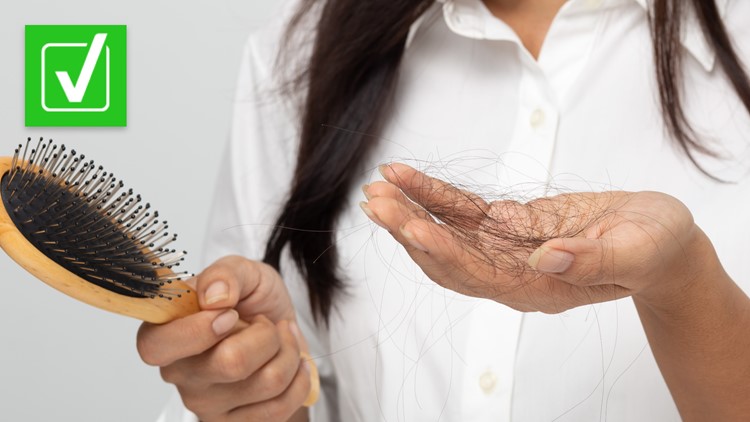Many people who have had COVID-19 in the past few years have developed a wide range of symptoms, including a fever or chills, cough, fatigue or a loss of taste or smell.
But VERIFY viewers, including Laura, want to know if a COVID-19 infection can also cause hair loss.
THE QUESTION
Can a COVID-19 infection cause hair loss?
THE SOURCES
- American Academy of Dermatology
- Cleveland Clinic
- University of Utah Health
- INTEGRIS Health
- Kimberly Salkey, M.D., associate professor and residency program director in the department of dermatology at VCU School of Medicine
THE ANSWER
Yes, a COVID-19 infection can cause temporary hair loss.
WHAT WE FOUND
Temporary hair loss or excessive hair shedding is normal after a fever or illness, such as a COVID-19 infection, according to the American Academy of Dermatology, the Cleveland Clinic and University of Utah Health. Emotional, physical and physiological stress related to the COVID-19 pandemic can also cause temporary hair loss or excessive hair shedding — but it is not a permanent condition.
“At any given time, about 90% of our hair is growing, about 5% is resting and 5% is shedding,” Cleveland Clinic dermatologist Shilpi Khetarpal said. “But when you have a major stress event, illness or shock, up to 50% of hairs can be pushed into the shedding phase.”
The American Academy of Dermatology says that many people develop noticeable hair loss or excessive hair shedding, known as telogen effluvium, about two to three months after recovering from a COVID-19 infection. Telogen effluvium happens when more hairs than normal enter the shedding (telogen) phase of the hair growth life cycle at the same time.
Outside of COVID-19, INTEGRIS Health says telogen effluvium can occur for many reasons, including viral infections, after surgery, hospitalization, hormonal changes and stress.
“There are lots of other things that can trigger the same type of hair loss. One of the most common triggers is having a baby,” VCU Health dermatologist Kimberly Salkey told VERIFY. “The hormonal changes and physiological changes and the emotional changes all really sort of stack up to create a big stressor that can lead to some hair shedding.”
The American Academy of Dermatology says that excessive hair shedding related to COVID-19 typically lasts for about six to nine months before it stops. After that, most people will begin to see their hair start to regrow.
“From that point, it can take as much as a year for the hair to get back to where it was before the whole problem began, but it doesn't cause any permanent hair loss. It does not cause you to lose all your hair,” Salkey said.
University of Utah Health says that in less than 10% of cases, some people may experience a condition called chronic telogen effluvium, where hair shedding can persist beyond six months. According to the health system, chronic telogen effluvium can be a symptom for long COVID-19 patients because their bodies are undergoing a significant amount of stress and are still not quite back to normal.
But hair loss as a result of COVID-19 infection, stress or other causes is treatable, according to the Cleveland Clinic. On its website, the nonprofit academic medical center says that exercise, eating a well-balanced diet with lots of protein, drinking enough water and managing stress are all ways to help combat temporary hair loss.



